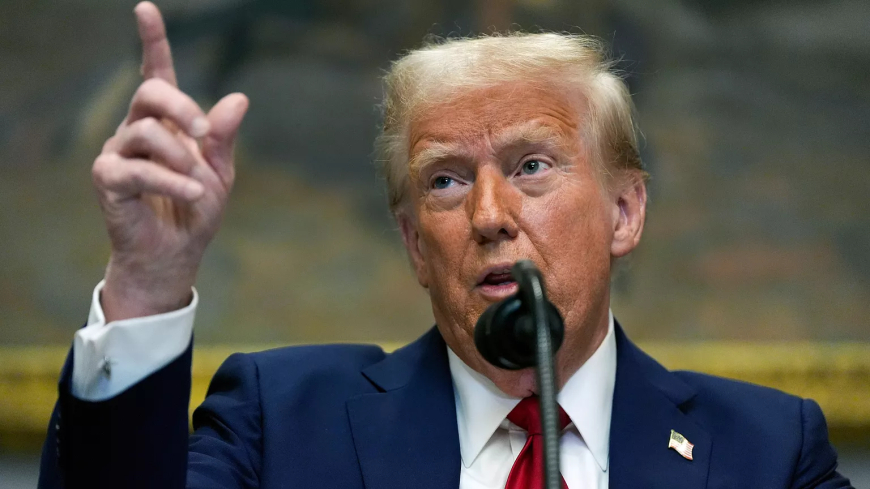Trump Claimed He’d Bomb Moscow — But Is He Really Willing to Cross Putin?
Trump claimed he warned Putin he'd bomb Moscow if Russia invaded Ukraine. But his past actions suggest a reluctance to truly confront the Russian leader.

In an explosive revelation during a 2024 private donor event, former U.S. President Donald Trump boasted that he had threatened to bomb Moscow if Russia dared invade Ukraine. The statement, part of a broader attempt to reinforce his image as a strongman, has ignited debate in political circles and international affairs communities alike. But while the comment generated headlines, seasoned analysts and insiders suggest Trump’s track record tells a different story — one of strategic hesitancy and unusual admiration for Vladimir Putin.
The Boast Heard Around the World
The setting was intimate: a high-dollar fundraising dinner where Trump, addressing his core donors, recounted a conversation with Russian President Vladimir Putin. According to Trump, he told Putin flatly that if Russian forces entered Ukraine, he would retaliate by bombing Moscow — a statement designed to showcase decisive deterrence.
However, Trump's own words revealed a telling caveat. He acknowledged that Putin only believed him “maybe 10 percent,” implying even the Russian leader himself was not fully convinced of the threat’s seriousness. This raises a critical question: was the threat ever actually issued, or was it posturing — carefully curated to impress a domestic audience?
Trump’s Record on Putin: Tough Words, Cautious Actions
Despite this latest claim, Trump’s actual behavior during his presidency often reflected a more accommodating stance toward Russia and its authoritarian leader. During key moments in global affairs, Trump:
-
Repeatedly cast doubt on U.S. intelligence findings about Russian interference in the 2016 election
-
Publicly praised Putin’s strength and “genius” strategy, even after the Ukraine invasion began
-
Hesitated to enforce or extend meaningful sanctions without congressional pressure
Behind closed doors, multiple former officials have described Trump as deferential to Putin — sometimes unusually so. Even while calling himself the toughest president on Russia, Trump regularly undermined NATO allies and questioned America’s commitments to European defense, both of which directly benefited Moscow’s long-term geopolitical objectives.
A Pattern of Strategic Ambiguity
Trump’s foreign policy approach, especially toward strongmen, has always been marked by ambiguity. He often adopted a mix of aggressive rhetoric and vague threats but stopped short of consistent follow-through. His language has sometimes been used more as a negotiation tool — shock and awe — rather than as a prelude to hard policy decisions.
This strategy arguably kept adversaries guessing, but it also created confusion among allies and within U.S. agencies. With Putin, this ambiguity has proven particularly controversial, especially as the Russian leader has continued to escalate aggression in Ukraine, suppress internal dissent, and align more closely with China and Iran.
Fear or Strategy? Reading Between the Lines
Critics argue that Trump’s failure to follow through on bold threats stems from a deeper fear — not personal, but strategic. Confronting a nuclear-armed state like Russia carries enormous risk. Trump, well aware of that, may have deliberately avoided direct confrontation during his term.
Yet the appearance of hesitation — especially when paired with overt admiration for Putin’s leadership style — weakens the deterrent effect of Trump’s statements. This raises concerns among national security experts that the U.S. may lose its credibility if threats are perceived as bluffs rather than commitments.
The Fallout: Russia Unfazed, Ukraine at War
Regardless of whether Trump’s comments were serious or not, they had no visible impact on Russia’s calculus. Putin invaded Ukraine in 2022, beginning the deadliest conflict on European soil since World War II. Despite repeated warnings from Western leaders, Moscow launched a full-scale assault on civilian infrastructure, causing widespread displacement and humanitarian crises.
Since then, the war has only intensified. Russia has escalated its attacks with long-range drones and missiles, while Ukraine continues to seek international military aid. Trump’s claim that he could have prevented the invasion with a single phone call now seems dangerously naive — or at worst, deeply misleading.
Campaign Implications in 2025
As Trump mounts his bid for re-election, his foreign policy narrative is under renewed scrutiny. His supporters laud his transactional approach to diplomacy, arguing that his unpredictability worked as a deterrent. His critics, however, see a pattern of empty bravado and dangerous alignment with authoritarian regimes.
The Moscow threat story, whether factual or fictionalized, will likely be used to bolster Trump’s image as someone unafraid to wield U.S. power. But for many voters, especially those following developments in Ukraine, the question remains: can a leader who admired Putin truly be trusted to confront him?
Conclusion
Trump’s statement that he threatened to bomb Moscow may have electrified a room full of donors, but it is unlikely to change the reality of his record: a president who repeatedly showed reluctance to confront Putin in meaningful ways. The former president’s rhetoric continues to walk a fine line between calculated theater and geopolitical recklessness — a line that may become increasingly important as the 2025 election season unfolds.
As the war in Ukraine drags on and global alliances shift, the world will continue to watch not just what Trump says, but what he does — or fails to do — when power is at stake.











